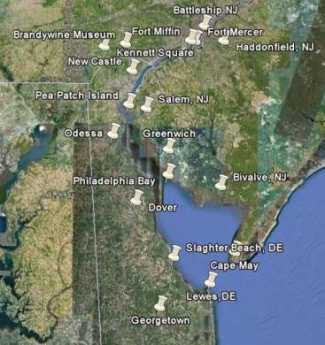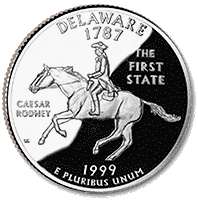Related Topics
Delaware (State of)
 Originally the "lower counties" of Pennsylvania, and thus one of three Quaker colonies founded by William Penn, Delaware has developed its own set of traditions and history.
Originally the "lower counties" of Pennsylvania, and thus one of three Quaker colonies founded by William Penn, Delaware has developed its own set of traditions and history.
Conventions and Convention Centers
When you have a big convention center, some circus is always coming to town. Philadelphia has always been a convention town, has had and still has lots of convention sites, and hopes to have more of the kind of famous convention we have had in the past.
Revolutionary Philadelphia's Patriots
All kinds of people were patriots in 1776, and many of them were all mixed up about what was going on and how they stood. Hotheads in the London Coffee House stirred up about an inoffensive Tea Act, Scotch-Irish come here to escape the British Crown, the local artisan class and the local smuggler class, unexpectedly prospering under non-importation, and the local gentry -- offended to be denied seats in Parliament like other Englishmen. Pennsylvania wavered until Ben Franklin stepped forward with a plan.
Causes of the American Revolution
Britain and its colonies had outgrown Eighteenth Century techniques of governance. Unfortunately, both England and America lacked the sophistication to make drastic changes smoothly.
Land Tour Around Delaware Bay
 Start in Philadelphia, take two days to tour around Delaware Bay. Down the New Jersey side to Cape May, ferry over to Lewes, tour up to Dover and New Castle, visit Winterthur, Longwood Gardens, Brandywine Battlefield and art museum, then back to Philadelphia. Try it!
Start in Philadelphia, take two days to tour around Delaware Bay. Down the New Jersey side to Cape May, ferry over to Lewes, tour up to Dover and New Castle, visit Winterthur, Longwood Gardens, Brandywine Battlefield and art museum, then back to Philadelphia. Try it!
Caesar Rodney Rides Through the Rain

|
| Caesar Rodney |
If you have a quarter minted in 1999, you can see a depiction of Caesar Rodney riding through the rain, mud and heat, all night, to cast his July 2 vote for independence at the 1776 Continental Congress. There are no known painted portraits of Rodney, probably because his face was badly mutilated by cancer which ultimately killed him.
On July 1, Thomas McKean and George Read had split Delaware's votes in a tie, and McKean had urgently sent word to Rodney, the absent third vote, that he must come to Philadelphia quickly. Rodney was suffering from cancer. It may thus have been Thomas McKean's idea to invoke the concepts of the Treaty of Westphalia to escape hanging for armed rebellion, but Ben Franklin seems more likely. Once an idea like that gets started in a gathering, it quickly becomes everyone's idea. But Franklin was the only one to stampede a group and take no credit for doing so.

|
| Rodney |
Schoolchildren in Delaware can be forgiven for asking why Rodney wasn't in Philadelphia for the vote without being sent for. And we don't really know. Rodney certainly had plenty of other things competing for his attention, like being a Supreme Court Justice, the Speaker of the Delaware Assembly and the de facto Governor of the State, as well as being a Brigadier General in the Militia (he later was made Major General in charge of the garrison at Trenton). One has to suspect, however, that he had not expected George Read to vote against independence. Read, after all, had married the widowed sister of George Ross, who did sign the Declaration.
Asthma, a notoriously intermittent condition, may have been a worse impediment to Caesar Rodney's ride than his cancer. Although he was badly disfigured, cancer did not kill him until 1784. The prospect of riding eighty miles in the rain with asthma may well have been the reason Rodney held off until he was absolutely certain his vote was needed. The esteem and affection that Delaware holds for this farmer from Dover can be gauged by the fact that he remained the elected speaker until the day he died, and during his last three months, the legislature held its meetings in his house so he could be present.
Originally published: Friday, June 23, 2006; most-recently modified: Thursday, August 29, 2019
| Posted by: bb | Mar 8, 2018 8:01 PM |